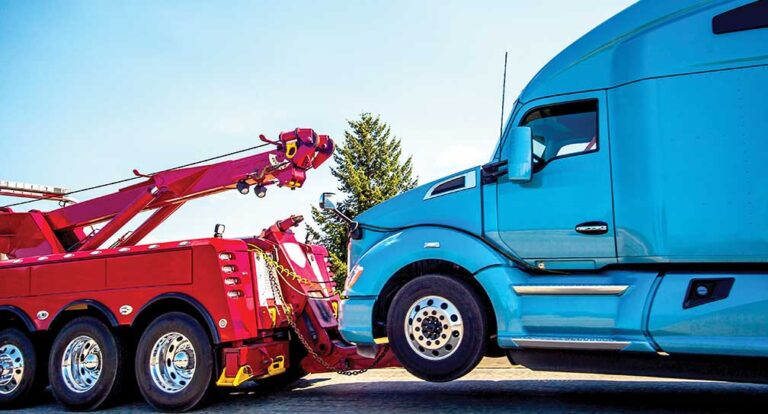Predatory towing ranks high among the major issues that create headaches in the trucking industry.
But the federal government is working to change that.
On July 10, the House Appropriations Committee voted 31-26 to advance a bill to the House floor that aims to crack down on predatory towing as part of the fiscal year 2025 transportation funding bill.
The bill would direct the Federal Motor Carrier Safety Administration (FMCSA) to facilitate discussions with local, state and private-sector stakeholders to develop guidelines for towing and recovery regulations at all levels of government.
Predatory towing entails any incident in which a towing operator severely overcharges, illegally seizes assets, damages assets by use of improper equipment, or illegitimately withholds the release of a truck, trailer and/or cargo.
Already the issue has gained support from top levels of government.
“When a truck driver’s vehicle is towed, they can’t earn a living until they get it back — leaving them vulnerable to predatory junk fees from towing companies,” said U.S. Transportation Secretary Pete Buttigieg. “We support the Federal Trade Commission’s (FTC) efforts to stand up for truckers by acting to ban junk fees and prevent predatory towing fees that can cause significant financial harm.”
In October 2023, the FTC proposed a ban on junk fees that would prohibit businesses from charging hidden and bogus junk fees by requiring them to include all mandatory fees when quoting a price.
FMCSA officials say they believe that predatory towing fee practices fall within the purview of FTC’s proposed rule, which would greatly benefit truckers if finalized.
In its comment to the FTC, FMCSA expresses strong support for the important protections and offers suggestions for additional restrictions that would further help protect truckers from predatory towing junk fees.
These suggestions include:
- Banning junk fees for unnecessary goods or services: The FMCSA suggests adding a provision that prohibits companies from charging any fee for an ancillary good or service that has no value, costs nothing extra to provide, or that reasonably would be assumed to be included in the upfront price of the good or service. For example, towing companies often charge “equipment fees” for using equipment that they already own and use routinely to provide towing services.
- Prohibiting or restricting excessive junk fee practices: The FMCSA encourages the FTC to consider prohibiting or imposing restrictions on excessive fee practices. These practices include charging an excessive number of fees, charging excessive amounts for a fee, or charging variable fees for fixed costs. The provision on excessive fees could focus on consumers who have little to no ability to avoid, negotiate, decline, anticipate, or limit the number or cost of the fees, or consumers who are vulnerable, in distress, or otherwise limited in choice by their circumstances.
- Treating each illegal junk fee as a violation: The FMCSA suggests that the final rule treat each illegal junk fee as a separate violation and that the rule expressly prohibit companies from charging or collecting mandatory fees that are not appropriately disclosed, are not included in the total price, and/or cannot be fully calculated upfront.
According to a recent study by the American Transportation Research Institute, the most common types of predatory towing are:
- Excessive rates, experienced by 82.7% of motor carriers, and
- Unwarranted extra service charges, experienced by 81.8% of carriers.
A majority of carriers reported encountered additional issues, such as truck release or access delays, cargo release delays, truck seizure without cause and tows misreported as consensual.
David Heller, who serves as senior vice president of safety and government affairs for the Truckload Carriers’ Association gave a huge thumbs up to the House committee’s July measure.
“I think it stands to reason that unscrupulous towing companies certainly need to be held accountable for their actions and the House language is a start in the right direction,” Heller said.
“There continues to be success stories at the state level that address these issues, and the apropos language will go far in beginning the process federally for FMCSA to instill more transparency in the process,” he continued. “We support the efforts of the appropriators in directing the agency to develop stronger guidelines that will hopefully eliminate the bad actors to operate on our highways.”
In a column published June 25 on FleetOwner.com, Heller further explained his disdain for predatory towing, writing that “trucking companies nationwide are being hit with massive tow charges that, in some cases, are more than the truck’s value. … Predatory towing has become the new normal. Our industry must find ways to keep this in check out of fear of being faced with a tow bill that creeps into six figures.”
Heller also noted that carriers across the country have also been dealing with the issue of holding cargo ‘hostage’ during towing incidents.
“In what basically amounts to theft, in predatory towing situations, the cargo on a towed trailer simply isn’t released to the carrier required to deliver it, creating even more significant problems by further disrupting the supply chain,” he wrote. “I have heard of instances where, even when the cargo is released, it is difficult at best to reclaim it.”
Over at the American Trucking Associations (ATA), president and CEO Chris Spear echoed Heller’s thoughts.
“ATA and our federation of state associations are fighting back against these predatory towers and ransom payments that target the truckers we depend on to deliver our nation’s goods,” Spear said. “We welcome this important step forward to develop commonsense reforms that will inject more transparency and fairness into the system and hold unscrupulous companies accountable.”
This story originally appeared in the September/October 2024 edition of Truckload Authority, the official magazine of the Truckload Carriers Association.
Born in Pine Bluff, Arkansas, and raised in East Texas, John Worthen returned to his home state to attend college in 1998 and decided to make his life in The Natural State. Worthen is a 20-year veteran of the journalism industry and has covered just about every topic there is. He has a passion for writing and telling stories. He has worked as a beat reporter and bureau chief for a statewide newspaper and as managing editor of a regional newspaper in Arkansas. Additionally, Worthen has been a prolific freelance journalist for two decades, and has been published in several travel magazines and on travel websites.








